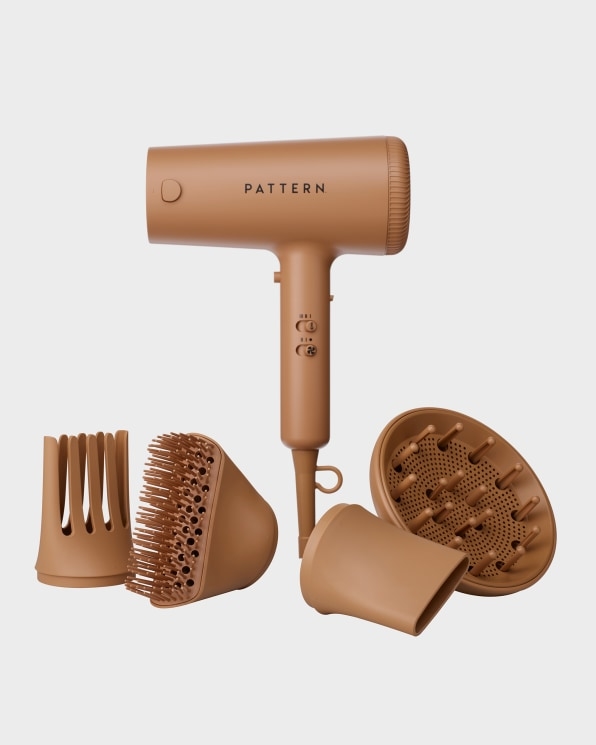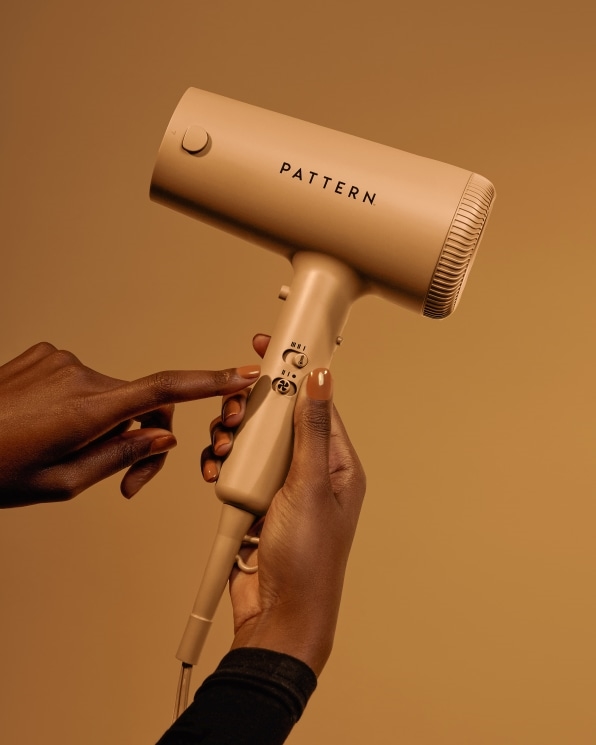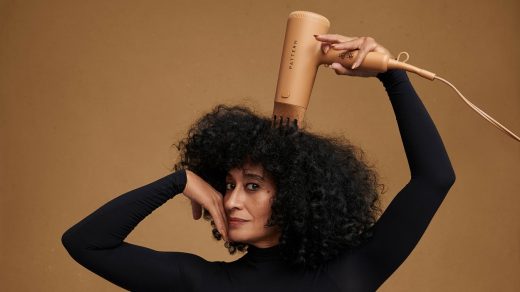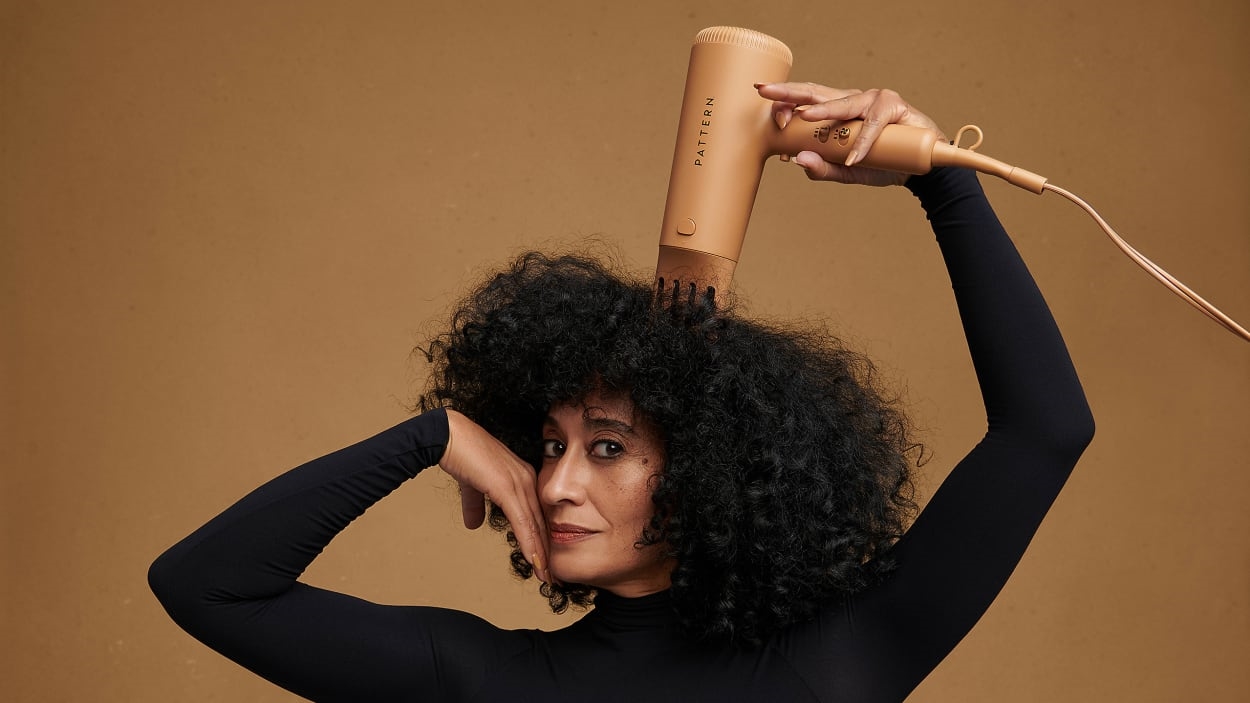Why actress and entrepreneur Tracee Ellis Ross spent 2 years redesigning the hair dryer
By Andrew Bevan
For Tracee Ellis Ross, haircare is self-care. “It’s one of the ways that we actively love and honor ourselves,” the actress and CEO of Pattern Beauty tells Fast Company.
Ross founded her haircare company in 2019 to create products for the natural hair community. In January, she launched her latest creation, an innovative new blow-dryer specifically designed for textured hair that she spent two years developing. “Our hair connects us to our legacy, and our physical appearance is how we present ourselves to the world,” she says. “For some people, it means nothing; for others, it’s an actual language. There are stories in our hair.”
A recent McKinsey report on Black representation in the beauty industry found that in addition to struggling to “find meaningful beauty experiences with big brands,” only 13% of more than 7,000 Black consumers surveyed said it’s easy to find beauty and hair products to suit their needs at mass-market retailers.
“I, like so many of us, have had horror stories where heat has either been used in a painful way or as a way to beat hair into submission—where our hair has been damaged and hurt to make it do things that allow us to enter a world where we are not received for who we are,” Ross says. “I’ve also had the experience where heat helped me explore more possibilities with my hair and have choices while trying to nurse it back to health.”

Aishia Strickland, cofounder of consumer and professional education platforms Black Girl Curls and Cut It Kinky, notes that in recent years, many women of color have been averse to using heat on their hair altogether.
“There have been whole challenges built around not using heat and many styling videos throughout the internet of ‘naturals’ doing heatless hairstyles,” says Strickland, who has had natural hair since 2011. “The industry is finally seeing and hearing the consumer, but there is a lot of education that will need to go into getting them comfortable with using heat in their regimen.”
In a hope to rectify the natural hair community’s complicated relationship with heat tools, Ross created the Pattern blow-dryer, which retails for $189 and comes with four attachments specially designed for textured hair. It debuted alongside a heat protectant and frizz-reducing shine spray on the Pattern Beauty website and will also be sold in store and online at Ulta later this year.
“We wanted to create a blow-dryer that was cutting edge yet intuitive,” Ross says. “It has a professional-grade engine inside of it, but it’s not so big that it’s a professional dryer that only a professional knows how to handle. If you didn’t go to beauty school, you can use this on your own head, and it will function properly and be a tool that actually works and isn’t going to get so hot on the low setting that you unexpectedly burn your hair—I’ve had that happen!”
Over the past three years, Ross has grown her haircare brand to nearly three dozen products—including shampoos, conditioners, styling creams, treatment masks, serums, and an array of accessories and tools. The star’s vision to disrupt the haircare industry is more than 10 years in the making: She wrote her first haircare-brand pitch after wrapping her star-making turn on the long-running sitcom Girlfriends in 2008.

“The timing would’ve been right then, and the timing is right now,” says the five-time Emmy nominee. “There was a real void in the market. The truth is that the beauty industry did not recognize the textured community in a way that I saw that was meeting my needs, let alone the rest of the community.
“In that time, I could clarify my vision, the language I wanted to use, and the ethos of what kind of brand I wanted this to be. That 10 years happened to match up with my career expanding, my voice clarifying, and my ability to articulate and push the importance and the need of where we were at and not be dissuaded into doing something different.”
Ross says that, while “hair has no gender or a race,” Pattern Beauty is centered around celebrating Black beauty.
“Black haircare has been considered a niche market in the back corners of retail stores for so long,” Ross says. “The same products have existed for my grandmother and mother that existed for me. My goal is to meet us where we are and have products that not only work but expand the possibilities of what we can do with it.”
As part of that mission, last fall Ross produced and hosted the six-part docuseries The Hair Tales for Hulu and OWN. Along with various cultural and hair experts and celebrities, including Issa Rae, Chloe Bailey, and Oprah Winfrey, Ross investigates the particular, individualistic, yet comparable understandings of beauty and identity that women of color have through their hair.
“For Black women, hair is not all of who we are, but it’s one of the forms of expression that I think is a portal into our souls, and it can also be used as an organizing principle and to connect us with a common language and a common experience,” she says. “What I’ve seen particularly is that this is a vast community of people who have not been serviced and have not been seen in a way that they would want choices, let alone products that work.”
While historically, the commercial hair industry has underserved women of color, Leanne Alie, host, and creator of the podcast Coiled is hopeful things are starting to shift.
“It’s only in the last couple of years that mainstream brands like Dyson have made products that are compatible with afro hair. Brands like Pattern Beauty, where Tracee Ellis Ross has such a wide appeal, are starting to turn the tide in terms of providing afro haircare products within the mainstream,” says Alie, who points to trailblazing Black-owned brands, such as Camille Rose, Afrochenchix, Bourne Beauty Naturals, and Tiwani Heritage—which is developing plant-based hair extensions as an alternative to plastic, synthetic hair. “I think we’re still lacking full accessibility of products, but what is exciting me is the future innovations within the industry.”
Pattern Beauty has also set out to alter the staid and problematic way the industry attempts to reach people of color. “The basis for marketing is you have a problem you need to be ashamed of, and you need to buy this thing to improve. I disagree with that,” Ross says. “Pattern has set out to create a celebratory space that didn’t exist before with the promise that we will meet your needs. There’s nothing wrong with you. You just need the right products to support what grows out of your head.”
As a new founder and CEO, Ross has learned to trust her instincts and rethink how products are packaged and marketed. “One of the things that was always important to me is that the conditioner was bigger than the shampoo because we use a lot more conditioner,” she says. “That is never taken into account, and it drives me crazy. I used to see ‘use a dime size.’ That’s hilarious. That’s good for the hair on my arm, or like my finger.”
But redesigning the packaging can lead to other challenges in retail stores. “Shelves are designed specifically for a regular-size conditioner and a shampoo that matches it,” she says. “How will we sit the conditioners on the shelf when the retail partner says we can’t do that? Let’s talk it through—these are the kinds of things that are really interesting and very exciting. They are the blind spots within the industry that people don’t realize are solidifying the systemic problems. As a founder who is using the products, you start to see where those spaces are that things don’t match up.”
She has worked to build her own platform with others in mind. “My mission in life is that I’m going to walk in, and I’m not just going to fight for me; I’m fighting for all of us,” she says. “I’m not afraid to push against the things and the systems that have not worked for and supported everyone.”
After launching her new hair dryer, Ross is already thinking about other potential tools for the natural hair community. “There are many places the brand could continue going, especially with heat and products—many of which are in the pipeline and development,” she says. “I’m only looking to create innovation that really is about function. I’m not a founder and a CEO interested in making things just to make them. I make them because they actually meet a need. They fulfill a promise.”
(33)



